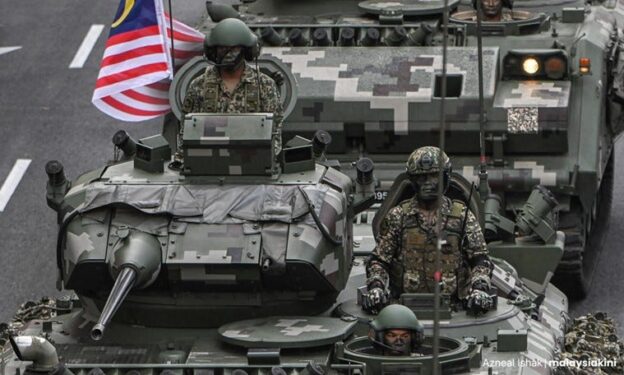MALAYSIA’s strategic location in Southeast Asia and its complex geopolitical landscape make national security a top priority. The country has been investing in modernising its defence capabilities, including acquiring new military assets such as fighter jets, submarines and naval vessels. This process has not been without controversy and challenges.
One of the main issues that Malaysia faces is how to balance transparency and secrecy in military procurement. The government needs to be open and accountable to the public in how it spends taxpayers’ money and how it acquires goods and services.
However, it must also protect sensitive information that could compromise national security and give an advantage to potential adversaries.
The recent scandal involving the purchase of two French-made Scorpene submarines by Malaysia’s government highlights the risks of compromised secrecy. The deal has been mired in allegations of corruption and kickbacks.
French investigators have been looking into the case for years and in 2018, they indicted several individuals and companies who are currently on trial for corruption charges.
Moreover, the Scorpene scandal has raised questions about the government’s procurement practices and the lack of transparency and accountability in the defence sector. It has also highlighted the risks of relying on foreign defence contractors, who may have agendas and interests that are not aligned with Malaysia’s national security objectives.
Another issue that Malaysia faces in balancing transparency and secrecy in military procurement is the risk of diminished negotiation power with defence contractors. When the government reveals its budget and intentions for acquiring military assets, it may give away its bargaining position and limit its ability to negotiate better deals. This, in turn, could result in higher costs for military assets and a strain on the country’s defence budget.
To address these issues, Malaysia can learn from the best practices of other countries, such as the US, Singapore and other ASEAN member states. These countries have managed to maintain a high level of secrecy in defence procurement while still being transparent and accountable in other areas.
For example, the US has a well-established procurement system that includes strict rules and regulations for protecting classified information and preventing corruption and conflicts of interest. It also has a robust oversight system that involves multiple agencies and congressional committees to ensure accountability and transparency.
Similarly, Singapore has a procurement system that emphasises transparency and competition for non-military purchases while maintaining strict secrecy for defence procurement. The country’s Ministry of Defence has a dedicated procurement agency that oversees all defence acquisitions and ensures that they are in line with national security objectives.
Furthermore, other ASEAN member states such as Indonesia, Thailand and Vietnam have also implemented procurement policies that balance transparency and secrecy in defence procurement.

Indonesia, for instance, has established a Defence Industry Policy Committee to oversee defence procurement and promote the development of the domestic defence industry. Thailand has a procurement system that emphasises transparency and competition, while Vietnam has a centralised procurement system that prioritises secrecy for defence acquisitions.
Based on these examples, Malaysia should adopt similar best practices for managing the risks of compromised secrecy and diminished negotiation power in military procurement. Here are some recommendations:
- Strengthen procurement regulations and oversight: Malaysia needs to update its procurement regulations and oversight mechanisms to ensure that they are aligned with international standards and best practices. This includes enhancing the role of the Malaysian Anti-Corruption Commission (MACC) in investigating and prosecuting corruption cases in the defence sector.
- Increase transparency for non-military purchases: Malaysia should prioritise transparency and competition for non-military purchases, such as office supplies and equipment. This will help reduce the perception of corruption and favouritism in government procurement and increase public trust in the system.
- Maintain secrecy for defence procurement: Malaysia should maintain strict secrecy for all defence procurement, including the budget, specifications, and negotiations with defence contractors. This will help protect sensitive information from potential adversaries and prevent compromises in national security.
- Develop a dedicated procurement agency for defence acquisitions: Malaysia should establish a dedicated procurement agency for defence acquisitions, similar to Singapore’s Defence Ministry. This agency should be responsible for overseeing all defence acquisitions and ensuring that they are in line with national security objectives.
National security is a complex and multifaceted issue that requires a careful balance between transparency and secrecy in military procurement. Malaysia must learn from the lessons of past scandals and adopt best practices from other countries, including ASEAN member states, to ensure that its defence capabilities are not compromised and that taxpayers’ money is spent wisely and effectively.
By strengthening procurement regulations and oversight, prioritising transparency for non-military purchases, maintaining secrecy for defence procurement, and developing a dedicated procurement agency for defence acquisitions, Malaysia can enhance its national security and reinforce its position as a stable and secure nation in Southeast Asia. – Jan 14, 2023
Dr Ahmad Zaharuddin Sani Sabri is a former director at the Institute of Tun Dr Mahathir Thoughts.
Main photo credit: Daily Sabah









